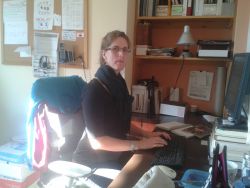Halifax Media Co-op
News from Nova Scotia's Grassroots
Shale gas and coal bed methane vs. your water
Geoscientist discusses risks of extraction technologies
K'JIPUKTUK/HALIFAX - The Halifax Media Co-op sat down for a conversation with the Ecology Action Centre's Jennifer West recently to discuss differences between coal bed methane (CBM) extraction and Hydraulic Fracturing in shale rock formations. As controversy rages in New Brunswick, and Nova Scotia conducts a public review on hydraulic fracturing on hydraulic fracturing, test drilling takes place in the coal seams of Pictou County.
As the Groundwater Coordinator for the EAC in Halifax, Jennifer West is responsible for a program monitoring water levels across Nova Scotia. Groundswell is a community based, volunteer operated program collecting hourly data from eight wells across the province.
A former environmental consultant, West began her studies at Mount Allison University prior to completing her Master's degree at Dalhousie. She credits former Professor David Mossman's passion for Earth History and internships at the Joggins Fossil Cliffs with inspiring her to focus her studies in the Geosciences.
As West explains, CBM and shale gas both require the pumping of existing groundwaters, but the great volumes of water and chemicals pumped at high pressure to crack rock formations used in fracking technology are generally not required in coal bed deposits. While CBM operators must pump existing groundwater out to extract gas, fracturing requires the removal of existing and added waters.
CBM may take place in close proximity to relatively shallow aquifers, while shale gas deposits tend to lie deeper. With both methods, large volumes of what is euphemistically called “brine water” (due to its large mineral content) may contain dangerous heavy metals and radioactive materials. This must be stored for future treatment.
Storage was done in surface holding ponds, in the case of waters from fracking which took place in the Noel Shore area of Nova Scotia in 2007-2008. Ponds were created in Kennetcook and later, Debert. These must be skimmed in order to keep them from overflowing due to rainfall. Local residents are concerned that these ponds may be leaking and contaminating local water supplies.
One pond of fracking water from these operations cannot be traced as neither the well operator nor the NS government can account for it, West said. Some of the waters were run through the municipal treatment facilities in Windsor, NS which are not equipped to deal with the chemicals and radioactivity, and flushed into the Bay of Fundy.
The remaining water is stored in the open ponds where evaporation may release chemicals into the air. According to West, there are no existing methods to adequately remove all of the contaminants from the fracking waste water.
As the provincial review of hydraulic fracturing moves forward, West believes the “Out of Control” report, created by the Nova Scotia Fracking Resource and Action Coalition is the “most relevant and important information” for Nova Scotians. (EAC is a founding member and sits on the steering committee of NOFRAC).
West suggests residents living within lease agreement blocks, where extraction activities may occur, should learn more about their drinking water and inform themselves and their municipal governments of the need to protect it. She feels baseline water quality assessment will be crucial to determining whether local areas are affected adversely.
Listen to the full interview with Jennifer West linked above, or download for later listening.
The site for the Halifax local of The Media Co-op has been archived and will no longer be updated. Please visit the main Media Co-op website to learn more about the organization.



